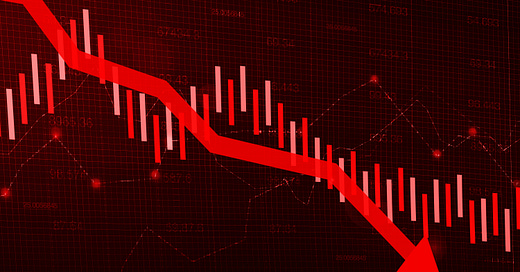After the Crash
On Accountability, Epistemic Humility, and the Collapse of Performed Certainty
I want to ask a sincere question to those who, with unwavering confidence, assured us that Donald Trump would be a better steward of the economy, of national security, of foreign relations: What now?
Today, as markets plummet in response to Trump's announcement of sweeping tariffs—54% on China, 20% on the European Union, 46% on Vietnam, 32% on Taiwan, with a 10% baseline on everything else—I find myself revisiting conversations from months ago. Conversations where I was told I suffered from “Trump Derangement Syndrome” for suggesting that his economic policies might destabilize markets. Where I was informed that his bombastic threats were merely “negotiating tactics.” Where I was assured that those who couldn't see his strategic brilliance simply failed to understand his methods.
The Dow futures are down over 1,000 points. Multinational companies are watching their stock values evaporate. Economists across the political spectrum are warning of inflationary pressure, supply chain disruptions, and retaliatory measures that will compound the damage. And this comes after Trump has already destabilized NATO, alienated key allies, and emboldened adversaries with erratic foreign policy decisions.
I don't write this to say “I told you so.” That would be small comfort amid genuine economic pain. I write this to ask a more fundamental question about epistemic authority: Why should we continue to listen to commentators—professional or amateur—who were not just wrong, but confidently, dismissively, insultingly wrong?
Some of my friends no longer speak to me. They've withdrawn from conversations where they once pronounced with smug certainty that my concerns about Trump were “unhinged.” They're embarrassed, I suspect, not just by being wrong, but by how forcefully they dismissed warnings that have since proven prescient.
This matters beyond personal vindication. It speaks to a deeper crisis in our information ecosystem. Those who were catastrophically wrong face no consequences for their failed predictions. They retain their platforms, their influence, their authority to shape public opinion. Meanwhile, voices that accurately assessed risks are still labeled as “deranged” or “suffering from Trump Derangement Syndrome”—even as their forecasts materialize before our eyes.
This isn't about politics. It's about epistemology—about how we know what we know, about whose judgment deserves our trust. When someone confidently predicts market stability under Trump's trade policies, and the opposite occurs, that should diminish their credibility on related matters. When someone dismisses warnings about constitutional violations as paranoia, then defends actual violations when they occur, that should undermine their moral authority.
Yet our discourse doesn't operate this way. Instead, failed forecasters simply move the goalposts. “The market drop is temporary.” “This is part of a brilliant strategy you can't yet see.” “These tariffs will create jobs, just wait.” Each new rationalization bypasses the essential fact: they were wrong about fundamental predictions, and they expressed those wrong views with absolute certainty.
I'm not claiming perfect foresight. I've been wrong about many things. But I've tried to hold my convictions with appropriate epistemic humility—to acknowledge uncertainty while still identifying clear dangers. Meanwhile, those who spoke with absolute confidence about Trump's economic genius are now either silent or constructing elaborate justifications for outcomes they insisted would never happen.
Two plus two equals four. There are twenty-four hours in a day. And economic nationalism through blunt tariff instruments has predictable consequences that economists across the political spectrum have understood for generations.
The center must be held—not because it is easy, but because it is ours to hold. Part of holding that center is demanding accountability from those who claim the authority to shape our understanding of the world. If we continue to grant equal credibility to those who have been catastrophically wrong and those who have been largely right, we undermine the very notion of expertise, of learned judgment, of wisdom earned through correct discernment.
So I ask again: What now? Will those who confidently dismissed concerns about Trump's economic policies acknowledge their error? Will they reconsider their epistemic framework? Or will they simply find new rationalizations, new ways to avoid the cognitive dissonance that comes from confronting one's own misjudgment?
The markets have rendered their verdict. Reality has spoken. It's time our discourse reflected it.






They told us they were going to crash the market and destroy the economy before the election. Elon Musk said it. Of course this is what they were going to do. Maybe it helps to know what they’re like and what they talk about *constantly* but they have been talking like this for 9 years. Steve Bannon’s fantasies about world collapse (based on a book he read in 8th grade or something) were discussed in 2016…All the tech fascists are enchanted by the idea of collapse. The crypto ideologues had this as part of their fantasies as soon as bitcoin was created. This is a libertarian’s dream.
The intention IS to take a wrecking ball to the way things run. They believe that the only way to truly affect change in moribund, beholden America is to blow the system up. The system hasn't worked for many a Trump voter in, well, possibly forever, so they think that this is absolutely what's needed. (And I doubt most Trump voters have a stock portfolio so that news doesn't register.)
Their mistake is in thinking they will somehow be taken care of through all this shock to the system and rebuilding of the country into an ethno-nationalist patriarchal nirvana. They are about to find out just how incredibly wrong they are.